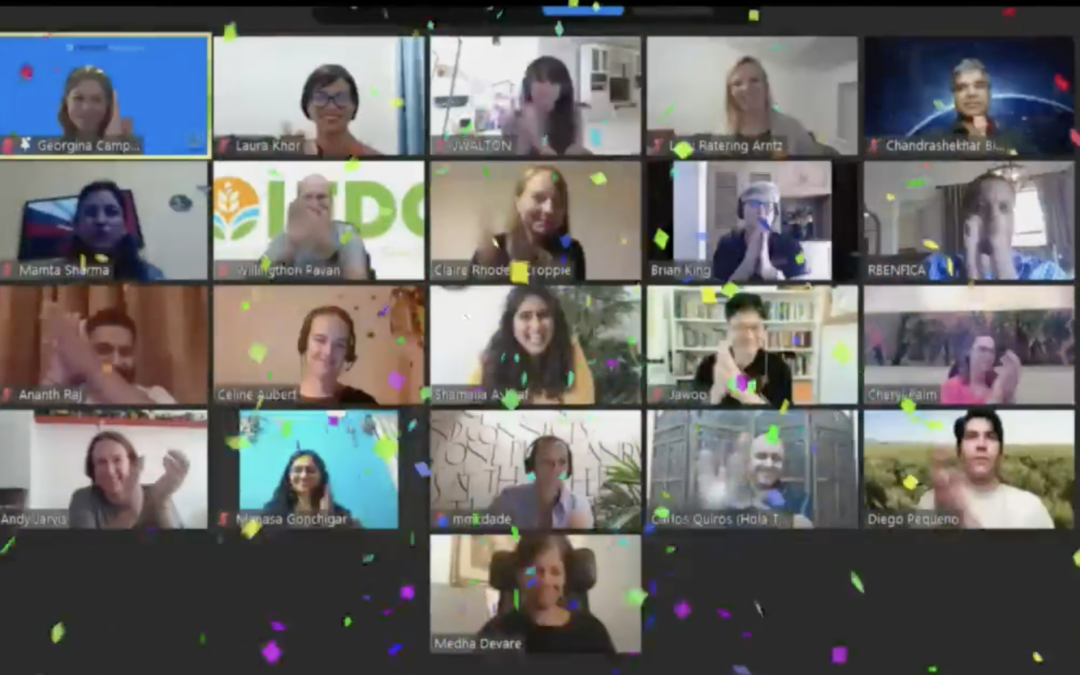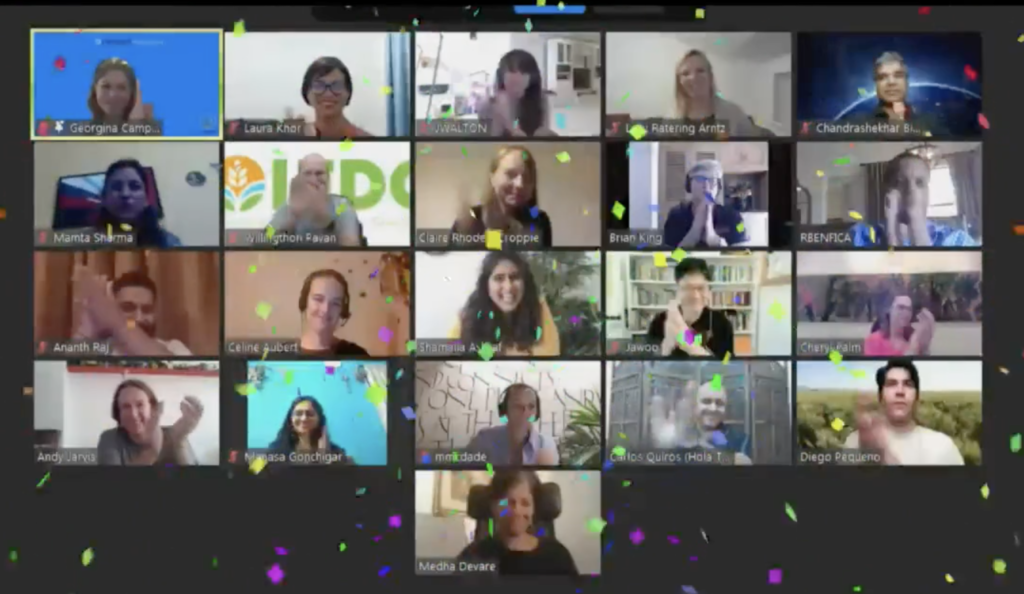CGIAR awards Inspire Challenge winners 700K to respond to food system crises
The fourth cohort of Inspire Challenge winners, innovative projects using big data for agricultural development and research, were awarded US$ 100,000 each at the 2020 virtual CGIAR Convention on Big Data in Agriculture.
The Inspire Challenge—CGIAR’s signature digital innovation process—leverages meaningful partnerships between CGIAR centers and expert industry partners to link digital technologies for impact in developing economies. They mobilize underused or misused data, especially CGIAR data, to better the lives of smallholder farmers.
The winners were announced at the Inspire Challenge award ceremony that closed the virtual 2020 CGIAR Convention on Big Data in Agriculture, 19-23 October. The convention brought together more than 1,300 researchers, industry experts, donors and investors, agripreneurs, and youth from around the globe to engage on topics around food security in times of crisis, inclusive digital transformation, and agile digital technologies. As the first One CGIAR Convention, the event also highlighted how CGIAR’s 13 global research centers are employing dynamic digital methods to combat food security challenges flowing from current crises.
In light of this year’s food system shocks due to the recent pandemic, the 2020 Inspire Challenge evaluation included specific COVID-19 response, recovery, and resilience metrics added to the judging rubric. Applications were received under four categories: Sustaining Farm Income, Measuring and Building Resilience, Sensing and Renewing Ecosystems, and Revealing Food Systems, with the latter two being co-designed with funders to specifically address pandemic-related challenges.
More than 120 submissions were received and almost all 13 CGIAR Centers were represented in the 15 projects selected as finalists. Project teams pitched live during the convention to a panel of expert judges that included: Sieglinde Snapp (Michigan State University), Rhiannan Price (DevGlobal Partners), Cheryl Palm (University of Florida), Dina Najjar (ICARDA), and Chong Kean Ng (Asian Development Bank).
“The 2020 Inspire winners aim to create more resilient food value chains in the face of the COVID-19 pandemic and climate shocks,” said Inspire judge Cheryl Palm, Research Professor in Agricultural and Biological Engineering and a core faculty of the Institute for Sustainable Food Systems at the University of Florida.
“Projects such as these will help assure safer food, collect much needed ‘real time’ diet diversity information for tracking and targeting malnutrition, and their experimentation with AI platforms such as IBM Watson will help provide advisory messages at times that extension agents cannot get to the field. It will be exciting to see how these innovative teams roll out their projects.”
Coordinator for CGIAR Platform for Big Data in Agriculture, Brian King is confident that, “only CGIAR could source digital innovations with such technical depth and global breadth. It gives me hope that we will be able to help drive much-needed transformations in global food, land, and water systems.”
2020 Inspire winners
During the live awards ceremony, grants of US$100,000 were awarded to:
- Croppie – the PhotoCropping app | The Alliance of Bioversity International and CIAT, Producers Direct & IDEO.org
Croppie will gamify real-time photo data collection from smallholders by incentivising PhotoCropping, i.e. taking and sharing photos of their crops, that generates primary data which supports AI/ML model training and empowers smallholders with yield insights, for more effective planning, risk management and resilience.
- N-ALLyzer: From Nitrogen to ALL other nutrients | CIMMYT, IFDC & Optionline Brazil
The N-ALLyzer app will assist farmers in making optimal economic decisions on fertilizer application rates, with minimal user input. Unlike the traditional nutrient calculations, the app requires simple mobile phone-based pictures of maize or wheat leaves and answers key questions on farming, to generate fertilizer recommendations customized using big data analytics and simulations.
- The ClimaCell Locust Project | ICARDA, ClimaCell, Kenarava Group, NOAA & NCAR
ClimaCell seeks to contribute to the locust crisis with an innovative, 360-degree locust monitoring tool. Leveraging ClimaCell.co’s weather intelligence engine, the tool will share early warnings, increasing countries’ capacity to prepare and respond early and effectively.
- Citizen-H2D3 | IITA, RAB Rwanda, The Alliance of Bioversity International and CIAT, CSIRO & University of California, Davis
Citizen-H2D3 will use its multidisciplinary team of experts to develop a system that will leverage on principles of citizen science and easy-to-deploy ICT tools to provide [near] real-time intelligence on individual daily dietary diversity and other nutrition and purchasing metrics.
- “Hola Talia” Boosting extension service through AI | The Alliance for Bioversity International and CIAT & Tecnologico de Costa Rica
The project aims to create TALIA (Tu agrónoma/o lista/o con inteligencia artificial), the first agricultural advisory hotline operated entirely by state-of-the art AI. The team will train an established natural language processing technology to become a knowledgeable, always-available, and talkative AI-driven agricultural extension.
- Big data in resilience of rangeland communities | ILRI, ICRAF & ICARDA
This project aims to establish the first-ever global data platform, which will consolidate data on rangelands, including rangelands health, change, risks and opportunities for restoration from existing sources as well as from new sources such as satellite imagery and crowd-sourcing.
- Rapid, Low-Cost Aflatoxin detection using AI | ICRISAT & Pure Scan AI
This project seeks to improve an existing low-cost device (<USD50) for rapid aflatoxin detection in peanuts and maize using image processing under UV light. This would help lower the amount of aflatoxin that enters our food chain and have multitudes of impact on population health.
Improved process for innovation and inclusivity
Review of the 2020 Inspire Challenge process reveals that more than 80% of submissions proposed the use of machine learning or artificial intelligence—up from 65% in 2018 and 2019 and 10% in 2017. Since beginning the Challenge in 2017, the innovation process has seen a significant drop in “basic research” submissions; more than 80% of 2020 proposals sought to take advantage of knowledge on primary problems which are clearly understood by the research community. Like 2018 and 2019, the majority (60%) of this year’s proposals intended to primarily benefit small producers (crop and livestock farmers, fisher-folk), compared to 8% in 2017.
More rigorous gender components were incorporated into the 2020 Inspire Challenge application; every proposal was asked about the potential direct and indirect gender implications of their project and the strategies that would be employed to manage those dynamics.
These indicators and adaptations demonstrate that the Inspire Challenge continues to improve its ability to target big data innovation in the agricultural sector that benefits both men and women smallholder farmers, fisherfolk, and livestock keepers.
For more information on the annual innovation process, visit the Inspire Challenge page.
To view previous winners and keep up with these projects’ progress throughout the grant year, visit the Inspire Challenge project pages.
***
The CGIAR Platform for Big Data in Agriculture embraces the power of big data analytics, supporting CGIAR as it becomes a leader in generating actionable data-driven insights. It builds capacity throughout CGIAR to generate and manage big data, assisting CGIAR and its partners’ efforts to comply with open access/open data principles to unlock important research and datasets. It also empowers researchers to strengthen data analytical capacity, developing practical big data tools and services in a coordinated way, and it addresses critical gaps, both organizational and technical, expanding the horizon of CGIAR research. The Platform is co-led by the Alliance of Bioversity International and CIAT and the International Food Policy Research Institute (IFPRI).
CGIAR is a global research partnership for a food-secure future dedicated to reducing poverty, enhancing food and nutrition security and improving natural resources. CIAT, IFPRI and ICRISAT are members of the CGIAR Consortium.
October 28, 2020
Hannah Craig
Communications Deputy
CGIAR Platform for Big Data in Agriculture
Latest news






